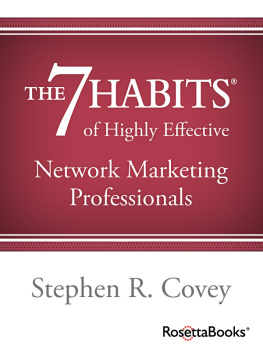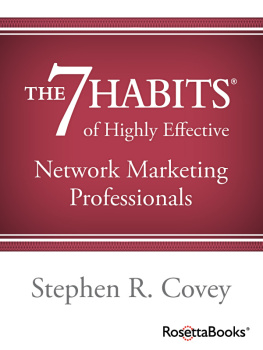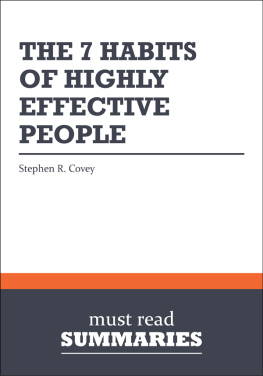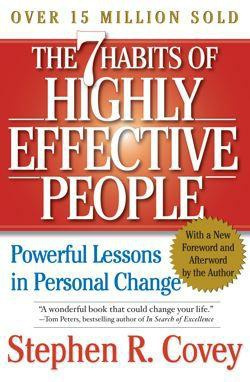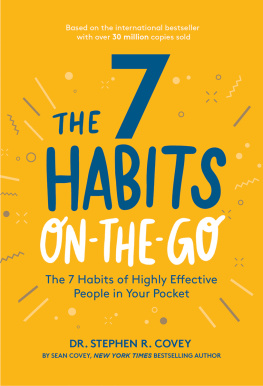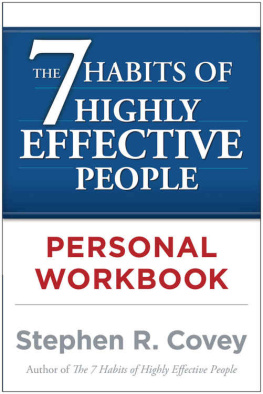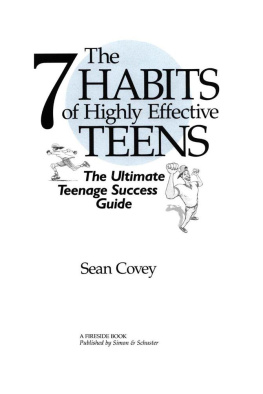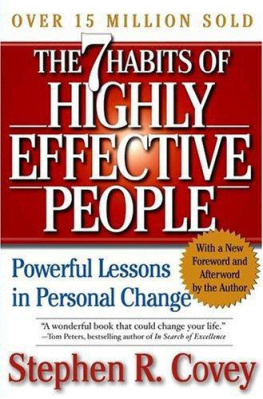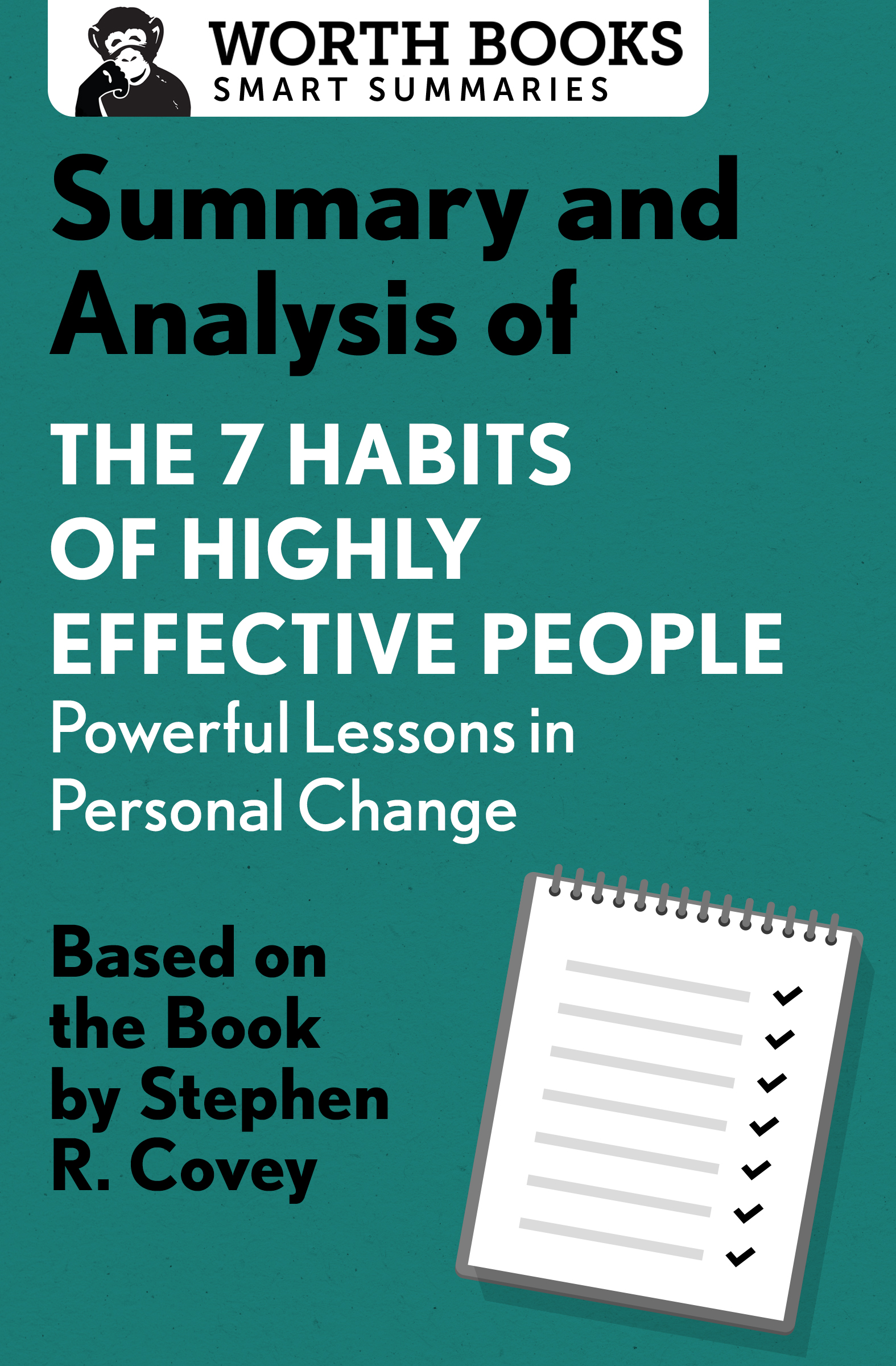Summary and Analysis of
The 7 Habits of Highly Effective People
Powerful Lessons in Personal Change
Based on the Book by Stephen R. Covey

Contents
Context
Stephen R. Coveys The 7 Habits ofHighly Effective People , first published in 1989, is one of thebestselling self-help books of all time, spending 250 weeks on the New York Times bestseller list, and selling more than 25million copies worldwide. The appeal of the Seven Habits may lie in theirsimplicity. While researching the history of self-help for his doctorate at BrighamYoung University, Covey found that advice literature in the first 150 years ofAmericas existence focused on building character, and discussed ethical traits likeintegrity, industry, and courage. Conversely, the self-help books of the past fiftyyears consisted of what Covey referred to as shallow pandering. By returning thefocus to the Character Ethic, Coveys Seven Habits reintroduced traditional valuesof success into modern management theory.
Coveys emphasis on the character and self-determination found in early American success literature, rather than specific management skills, led critics to accuse the author of simply stating the obvious. One reviewer went so far as to accuse him of peddling banal truisms. Covey is rumored to have responded: Whats common sense just isnt common practice. In other words, although the Seven Habits are founded on common-sense principles, they offer readers strategies for implementing these truisms into their daily lives.
The message clearly spoke to readers. In 1996, Time listed Covey as one of the twenty-five most influential Americans. In addition to many other self-help titles, Covey published two follow-ups, The 7 Habits of Highly Effective Families in 1997 and The 8th Habit: From Effectiveness to Greatness in 2004. The 7 Habits of Highly Effective People remains a perennial top seller in the genres of business writing and self-help, and its message of self-management continues to be put into action by individuals and organizations around the globe.
Overview
The 7 Habits of Highly EffectivePeople opens with the words, There is no real excellence in all thisworld which can be separated from right living. This quote from David Starr Jordanintroduces the main idea of the Seven Habits: Being an effective person means beingprinciple-driven. If you want to adapt your behaviors to achieve personal andprofessional goals, you must shift your perspective of the world so that it alignswith your own deep-rooted principles.
The Seven Habits provide a step-by-step process to take a person from dependence to independence, and, ultimately, to interdependence. The habits are:
Habit 1: Be Proactive.
Habit 2: Begin with the End in Mind.
Habit 3: Put First Things First.
Habit 4: Think Win/Win.
Habit 5: Seek First to Understand, Then to Be Understood.
Habit 6: Synergize.
Habit 7: Sharpen the Saw.
The first three habits fall into the category of private victories, and are concerned with self-mastery. They help you realize that you are in control of your own responses, and offer a way to organize your life around core values. Habits 4 through 6 fall under the category of public victories and provide strategies for engaging with those around you. The sixth habit, synergy, occurs when all of the first five habits are being put into practice. The seventh habit allows the first six to happen on a continual basis, as it focuses on renewing the wellspring of the individual.
Summary
Part One: Paradigms and Principles
Inside-Out
In his many years of working in leadership training, Covey has encountered numerous types of personal and professional problems: family and career balance; trouble meeting personal and life goals; difficulty relating to people interpersonally; and parenting and marriage troubles. Advice literature, which mostly gives tips for how to change behavior, is ultimately ineffective, Covey believes, because it does not strike at the root of the problem. In order to change how they act, people need to change how they think.
Covey uses an example from his own life as an illustration. At one point, his school-age son was struggling socially, academically, and athletically. Covey and his wife were desperate to help, and tried several methods, including positive reinforcementwhen he struck out in a baseball game, they assured him, With hard work, youll do better next time! But their efforts were fruitless, and, when he did not improve, his self-esteem suffered even more. Covey realized that the problem lay not in his sons performance, but in his and his wifes perception of their son as somehow inadequate. If they wanted things to change, they had to change their perceptions. This meant valuing their son for who he was, rather than comparing him to other children or measuring him according to the expectations of others. This constituted a paradigm shift .
The Power of a Paradigm
A paradigm is a way to see the world, a model or framework for interpreting our experiences. A paradigm is a tool, a map for how to navigate circumstances. We each have two types of mental maps: one for the way things are (reality), and one for the way things should be (values). We rarely question these maps, but it is important to examine our paradigms and be open to changing them. Although we can focus on changing behaviors, without changing our paradigms, real, significant change will never happen.
The Personality and Character Ethics
Much recent self-help literature offers superficial ways to make simple changes. In contrast, older success literature focused on strong moral character. These two different approaches can be divided by the two ethics.
The Personality Ethic is mainly concerned with public image, status, and superficial interactions. It relies on simple, manipulative techniques to get people to like you, or intimidate people into respecting you.
The Character Ethic is based on principles such as integrity, humility, courage, justice, and patience. It focuses on fundamental values that drive behavior. This ethic is not concerned with social status, but with living according to universal principles of humane existence. When you base your paradigm on the Character Ethic, you learn to set goals according to these fundamental principles, and, as a result, to find a new level of thinking.
A New Level of Thinking
People who work according to an outside-in paradigm view themselves as the victimsvictims of other peoples flaws, or of less-than-optimal circumstances. This paradigm operates according to the Personality Ethic. It allows people to be fooled into thinking that there are easy fixes to fundamental problems. By shifting to the paradigm of inside-out thinking, we can begin to view ourselves as responsible for our own circumstances. The inside-out approach uses core values and principles to guide all changes. In other words, all change begins with the self, and then moves outward.
Need to Know: In order to change, its not enough to alter our daily activities. Instead, we must shift how we view the world in general, and our own situation in particular. Inside-out thinking allows us to remake our paradigm so that decisions and actions align with core values and goals.
The Seven HabitsAn Overview
Covey offers his definition of a habit as the intersection of knowledge, skill, and desire. To create a habit, you need the knowledge of what to do and why, the skill to be able to do it, and the desire or motivation to implement it. It can be difficult or painful to change, but the process itself can lead to happiness.








